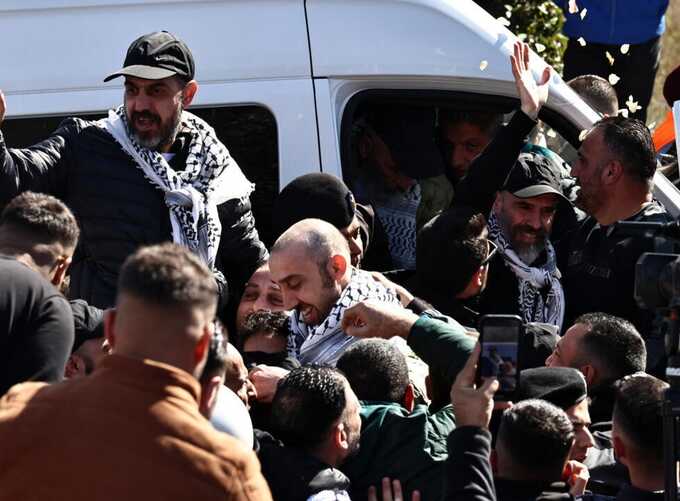Three Israelis and 369 Palestinians released following a week of ceasefire tensions

Hostages and prisoners reunited with loved ones as political concerns shift to the second phase of the truce.
Hamas has freed three Israeli hostages from Gaza and Israel has released 369 Palestinian prisoners and detainees in its custody, the sixth exchange in a fragile month-old ceasefire that almost collapsed earlier this week.
On Saturday morning, Hamas and its ally Palestinian Islamic Jihad deployed about 200 fighters to take part in a choreographed handover ceremony in a square in the southern town of Khan Younis.
The three hostages – the Israeli-American Sagui Dekel-Chen, the Israeli-Argentinian Iair Horn and the Israeli-Russian Sasha Troufanov, seized from Nir Oz kibbutz in the 7 October 2023 attack that triggered the Gaza war – were forced to read statements from a stage in front of a crowd before they were handed over to the Red Cross.
The stage bore a poster which showed Jerusalem’s al-Aqsa compound, visible through a hole in the wall of a destroyed building, along with the slogan: “No displacement except to Jerusalem”, an apparent reference to Donald Trump’s proposal that Palestinians in Gaza be relocated to other countries.
Saturday’s handover unfolded more smoothly than past releases, and all three men appeared to be in good health. The gaunt appearance of the last group of released captives shocked and angered the Israeli public, and raised fears about the wellbeing of the remaining hostages.
Of the Palestinian prisoners released on Saturday, 333 had been captured or arrested in Gaza since the beginning of the war. They were taken straight to the territory. Thirty-six Palestinians serving life sentences in Israeli jails were also released. About two dozen were immediately deported through Egypt to other Arab countries. One was taken to Jerusalem and 10 arrived by bus in Ramallah, the main city in the West Bank and administrative centre of the Palestinian Authority, where a crowd had gathered to welcome them.
The prisoners, who were transferred to private cars and taken home, had all spent more than 20 years in Israeli prisons, according to Abdullah al-Zaghari, the chair of the Palestinian Prisoners Society.
Most of those released on Saturday had been part of the military wing of Fatah, the dominant faction of the Palestinian Liberation Organisation, and had taken part in violent uprisings against Israeli occupation.
“To feel free is indescribable,” said, Ameer Abu Ra’adaha, who spent 32 of his 51 years in jail. He said the prisoners knew there would be an exchange a few days before as the guards conducted raids on the cells and beat some of the inmates.
Abu Ra’adaha said he only found he would be among those released at 6.30am on Saturday. He was told by prison guards who presented the departing prisoners with a T shirt expressing their reluctance to let them go.
The T-shirts, produced on the orders of the head of the prison service, were printed with the words: “We will never forget and we will never forgive.”
Abu Ra’adaha was hailed a hero at a community centre in al-Amariri camp in Ramallah, dressed in a black cap and green jacket with a Palestinian keffiyah around his shoulders. Men queued to embrace him, while the hall filled with teenagers and young boys who had come to catch a glimpse of the emaciated veteran, who looked stunned and exhausted.
“I just want to get married, build a house and live my life,” Abu Ra’adaha said.
Saturday’s exchange marks the latest scheduled step in the first phase of the Gaza ceasefire agreement, which came into effect on 19 January. However, the future of the agreement is still uncertain: under the terms of the 42-day first phase of the ceasefire brokered by Qatar, Egypt and the US, negotiations for a second phase had been due to start on 3 February.
The Israeli prime minister, Benjamin Netanyahu, sent negotiators to Doha days later, but the delegation was not mandated to discuss phase two, which is meant to lay out steps towards ending the war.
The US secretary of state, Marco Rubio, whose country is Israel’s top backer and one of the truce mediators, is due to arrive in Israel late on Saturday to discuss the truce’s future and Trump’s depopulation plan with Israeli officials.
Arab leaders have flatly rejected Trump’s proposal, which international law experts say amounts to ethnic cleansing.
Saudi Arabia is hosting delegations from Egypt, Jordan, Qatar and the United Arab Emirates on Thursday for a summit on the issue, and the Arab League will convene to discuss alternatives on 27 February.
Read more similar news:
Comments:
comments powered by Disqus

































